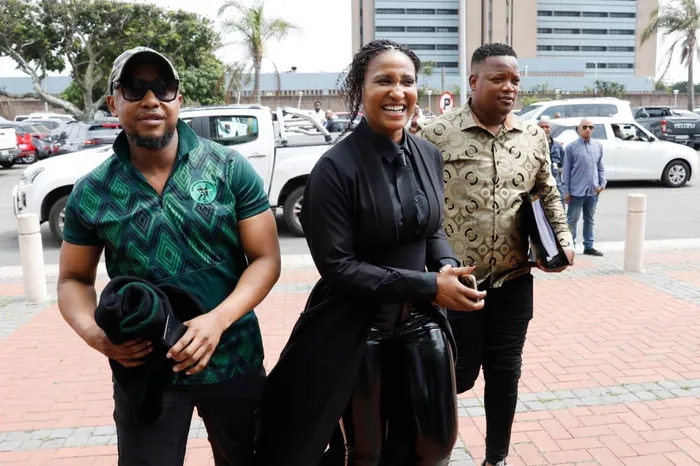Zuma's daughter not part of WhatsApp groups linked to deadly July unrest

Duduzile Zuma-Sambudla, daughter of former president Jacob Zuma, attends proceedings at the Durban High Court on charges related to the deadly July 2021 unrest.
Image: Doctor Ngcobo / Independent Newspapers
DUDUZILE Zuma-Sambudla was not a member of the Whatsapp groups that the State believes were central in inciting violence during the deadly July 2021 unrest in KwaZulu-Natal and parts of Gaunteng, the Durban High Court was told.
This emerged when the trial of former president Jacob Zuma’s daughter got underway on Monday.
She pleaded not guilty to charges of terrorism and incitement to commit public violence linked to the riots sparked by Zuma’s arrest for being in contempt of a Constitutional Court order.

Duduzile Zuma-Sambudla appears in the Durban High Court, where she faces charges linked to allegations of inciting violence during the July 2021 unrest.
Image: Doctor Ngcobo / Independent Newspapers
Zuma-Sambudla is accused of using social media to incite public violence. More than 300 people were killed during the unrest.
The civil unrest involved multiple crimes, including looting, arson, destruction of property, murder, and truck burnings, according to the State.
“Our initial investigations revealed that, following the Constitutional Court ruling resulting in former President Zuma’s incarceration, he handed himself in on the evening of July 7, 2021, to the Estcourt Correctional Services.”
The state said the violence began the following day.
“On July 8, as a result of that incarceration, there were different reactions - both support for and opposition to Zuma’s imprisonment - that led to the start of the unrest,” the state said.
This led to trucks being stoned, burned, and destroyed.
Investigators found that communication across provinces and the country was coordinated through social media platforms.
“There were a total of 164 WhatsApp social media chat groups created for the sole purpose of communicating from a high level to ground forces,” the state said.
Some of the groups had been created even before July 7, 2021, following the Constitutional Court’s finding on June 29, 2021.
Of these, investigators identified eight main WhatsApp groups responsible for providing direction, leadership, and encouraging violent protests and looting. Zuma-Sambundla was not in those groups mentioned.
From those eight, the state narrowed its focus to four key groups, identifying 103 persons of interest linked to posts encouraging or inciting violence, looting, and other criminal acts.
The state said the eight groups showed clear coordination between national and provincial levels.
“It shows that high-level information was filtered to provincial levels and disseminated to ground forces,” the state told the court.
The state argued that this network formed part of what it termed a “criminal value chain” behind the unrest.
The trial continues.
Cape Times